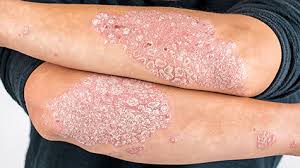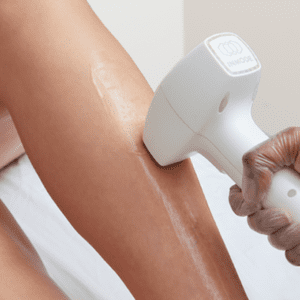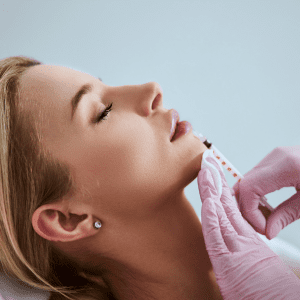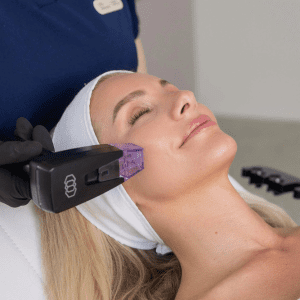
PSORIASIS
Holistic treatment for persistent, inflammatory skin conditions.
The skin condition psoriasis creates red, scaly, itchy plaques that mainly affect elbows, knees, scalp, lower back, and nails. The chronic illness causes an excessive immune reaction, which leads to skin cell production acceleration that results in thickened inflammatory skin patches. The medical condition of psoriasis exists independently of communicability because it leads to substantial adverse effects on life quality and self-image as well as physical comfort.
Rasa Derm delivers complete psoriasis therapy, which combines customised light-based and systemic and topical treatments according to each patient’s skin type, severity, and triggers.
The complex nature of psoriasis leads to multiple internal factors that determine both its occurrence rates and disease severity:
- Immune System Dysfunction: The immune system attacks healthy skin cells improperly, which leads to fast skin cell accumulation.
- Genetic Predisposition: People with family members who have psoriasis become more likely to develop the condition.
- Triggers in the environment: Environmental factors such as cold temperatures, skin damage, and strep throat infections lead to psoriasis flares.
- Stress: Frequently associated with increasing symptoms and flare-ups.
- Medication: Beta-blockers, lithium, and anti-malarial medications can make psoriasis worse.
- Lifestyle Factors: Obesity, alcohol consumption, and smoking may all lead to more chronic illnesses.
Knowing the subtype aids in creating a successful treatment strategy:
- The identification of specific subtypes enables healthcare providers to create optimal treatment plans.
- The most prevalent form of plaque psoriasis produces red areas that display silvery-white scales.
- Scalp psoriasis shows itself through dandruff-like symptoms, yet it spreads across hairlines.
- The skin condition guttate psoriasis produces small drop-like lesions that often appear after infections.
- Smooth, glossy lesions in skin folds (groin, armpits) are indicative of inverse psoriasis.
- The condition pustular psoriasis creates white pustules on red skin, which requires immediate medical evaluation.
- Pustules on nails, which cause pitting, together with thickness and discolouration, are symptoms of nail psoriasis.
- Erythrodermic psoriasis represents a rare but severe condition that causes widespread discomfort and skin peeling and redness throughout the body.
- Arthritis Psoriatica: The condition known as arthritis psoriatica leads to joint discomfort and swelling, which affects 30% of psoriasis patients.
- Metabolic Syndrome: Obesity, diabetes, and heart disease are associated with psoriasis.
- Mental Health Issues: The visibility of obvious lesions can trigger mental health problems, including anxiety, depression, and social withdrawal in patients.
The management of psoriasis through trigger recognition and elimination remains the only available method despite the absence of a cure.
- The skin barrier stays intact, and irritation decreases through regular moisturising practices.
- Sunlight therapy works best for symptoms, but excessive sun exposure may trigger new flare-ups.
- Yoga alongside mindfulness practice or counselling provides effective methods to manage stress-related flare-ups.
- Use mild fragrance-free cleansers instead of harsh soaps and scrubs when cleaning your skin.
- Smoking cessation together with reduced alcohol consumption will decrease treatment effectiveness while increasing inflammation in the body.
- The diet needs balance because some patients find relief through eating leafy greens and fatty salmon and other anti-inflammatory foods.
Our treatment approach combines multiple therapeutic modalities according to patient-specific needs along with the severity level and body locations of their disease. Your treatment plan may include one or more of the following:
1. Topical Therapies
- Topical Corticosteroids: First-line treatment for reducing inflammation and itching.
- Vitamin D Analogues (Calcipotriol): Helps slow down abnormal skin cell growth.
- Coal Tar Preparations: Traditional remedy for scaling and itch; often used in scalp care.
- Salicylic Acid: Helps exfoliate and reduce thick plaques.
For moderate to severe cases or when topical treatments fail:
- Methotrexate: Slows down immune cell activity and skin cell turnover.
- Cyclosporine: Suppresses immune function during severe flare-ups.
- Acitretin: A vitamin A derivative used in specific subtypes like pustular psoriasis.
- Narrowband UVB light therapy enables patients to manage plaque psoriasis symptoms and decrease their immune system overreaction.
- Non-invasive, suitable for widespread psoriasis or when oral medications are contraindicated.
4. Biologic Injections
Patients with moderate-to-severe, treatment-resistant psoriasis receive this treatment option.
- The treatment targets IL-17, IL-23, and TNF-alpha immune pathways.
- The treatment needs specialist supervision for administration along with regular monitoring sessions.
- Examples: Adalimumab, Secukinumab, and Ustekinumab, among others.
- The treatment targets IL-17, IL-23, and TNF-alpha immune pathways.
5. Scalp And Nail Psoriasis Protocols
- Coal tar and ketoconazole are found in medicated shampoos.
- Intralesional steroid injections for stubborn nail psoriasis.
- Custom protocols for sensitive areas like the scalp line and cuticle folds.
Why Choose Rasa Derm For Psoriasis Care?
- Dr. Veenu Jindal leads the team at Rasa Derm due to her extensive knowledge of chronic inflammatory skin conditions.
- The practice delivers complete patient care starting from diagnosis up to flare management and extending to long-term prevention.
- The advanced phototherapy unit operates in the clinic with controlled treatment schedules.
- The clinic provides patient education and lifestyle coaching in addition to holistic care practices.
- Prescriptions are customised for patients, and they receive scheduled follow-up appointments to achieve better outcomes.
When To See A Dermatologist?
Consult Our Specialists If:
- You have scaly, red plaques that don’t respond to moisturisers or OTC creams.
- There’s thickening or discolouration of nails.
- You develop joint stiffness or swelling.
- There’s thickening or discolouration of nails.
- You’re unsure whether it’s psoriasis or another skin condition.
Chronic doesn’t mean untreatable. Rasa Derm provides medical precision and compassionate care to all patients who need help with their mild sporadic skin outbreaks or their extensive skin lesions.
Schedule an appointment to begin your path toward skin clarity today.








